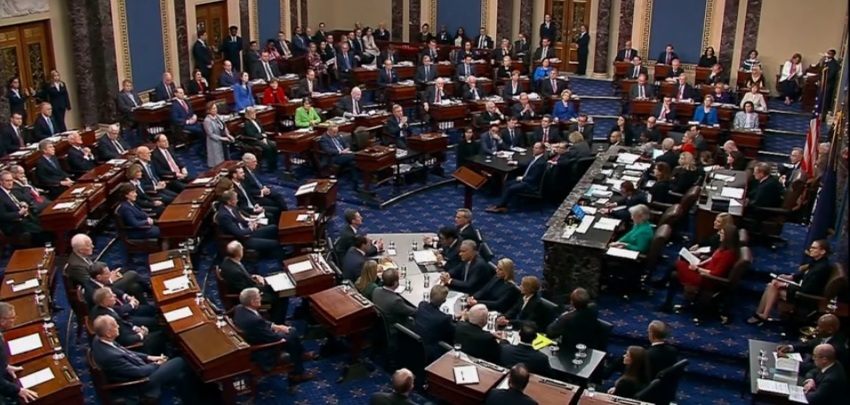Senate acquits President Trump

The United States Senate voted to reject both articles of impeachment against President Donald Trump, making him the third president in United States history to survive such a challenge.
On Article I of impeachment, the charge of abuse of power, the Senate found Trump not guilty with 52 senators voting not guilty and 48 senators voting guilty.
On Article II of impeachment, the charge of obstruction of Congress, the Senate found Trump not guilty with 53 senators voting not guilty and 47 senators voting guilty.
The votes came after lengthy debate on the Senate floor. Senator Kamala Harris of California argued that the House managers made a “compelling case” for Trump’s removal from office.
“They have shown that the president of the United States of America withheld military aid and a coveted White House meeting for his political gain,” said Harris.
Harris also denounced the Republican-controlled Senate’s handling of the impeachment trial, calling it a “miscarriage of justice,” arguing that Trump will “escape accountability.”
Senator Roy Blunt of Missouri labeled the impeachment process as a “partisan-driven” effort from the Democrat-controlled House of Representatives.
“We don’t want partisan impeachment to become an exercise that happens when one party, not the party of the president, happens to have a majority of the votes,” said Blunt.
“In their haste to put this case together, the House sent the Senate the two weakest articles of impeachment possible.”
The votes largely fell on party lines, save Sen. Mitt Romney, R-Utah, who announced his decision to vote guilty on the abuse of power charge by stressing that it was based on an “inescapable conviction that my oath before God demanded it.”
Last year, a whistleblower came forward claiming that Trump had unlawfully asked Ukraine to investigate the son of potential Democratic presidential candidate Joe Biden and the corruption surrounding the Ukrainian natural gas company Burisma that paid Hunter Biden $3 million to be named as a member of its board while his father was overseeing the U.S.'s Ukraine policy under the Obama administration.
The request was seen by many to be the president asking for foreign interference in the 2020 election. The transcript of that conversation can be read here.
Last September, Democratic House Speaker Nancy Pelosi announced that the House was going to pursue a formal impeachment inquiry, citing the claims of the whistleblower and alleged mistreatment of the whistleblower.
In November, the House Intelligence Committee held a hearing featuring sworn testimony from acting Ambassador to Ukraine William Taylor, Deputy Assistant Secretary of State for European and Eurasian Affairs George Kent, and former Ambassador Marie Yovanovitch.
Many considered the testimony by U.S. Ambassador to the European Union Gordon Sondland, a Republican and former Trump campaign donor, to be especially damning against the president.
Sondland told the Committee that he considered the phone call between Trump and Ukrainian President Volodymyr Zelensky to include a “quid pro quo” even though the president never said it.
“I know that members of this Committee have frequently framed these complicated issues in the form of a simple question: Was there a 'quid pro quo?' As I testified previously, with regard to the requested White House call and White House meeting, the answer is yes,” he stated, as reported by CBS News.
Sondland also stated in his testimony that “everyone was in the loop” on the call and that “everyone was informed via email on July 19, days before the presidential call.”
In December, the House voted to impeach Trump, approving the abuse of power charge in a vote of 230-197 and the obstruction of Congress charge in a vote of 229-198.
Last month, the Senate held the impeachment trial, with U.S. Supreme Court Chief Justice John Roberts presiding.
Jay Sekulow, a lawyer with the conservative legal group the American Center for Law & Justice, was part of the defense team for the president and argued that the impeachment process was part of a years-long partisan effort to remove Trump from office.
“When the Russia investigation failed, it devolved into the Ukraine. A quid pro quo, when that didn't prove out it was bribery or maybe extortion,” he declared on the first day of the trial.
“What are we dealing with here? Why are we here? Are we here because of a phone call or are we here, before this great body, because since the president was sworn into office, there was a desire to see him removed?”
Democratic Representative Jason Crow of Colorado, one of the House managers arguing for Trump’s removal from office, stated that “duty demands” they find Trump guilty.
“I don’t pretend that this is an easy process. It’s not designed to be easy. It shouldn’t be easy to impeach or convict a president,” stated Crow. “In America, no one is above the law, even though elected president of the United States.”
“If you believe … that the president’s efforts to use his official powers to cheat in the 2020 election jeopardize our national security and are antithetical to our democratic tradition, then you must come to no other conclusion that the president threatens the fairness of the next election and risks putting foreign interference between the voters and their ballots.”
During the impeachment trial, The New York Times reported on a leaked copy of a forthcoming book by former Trump national security adviser John Bolton which appeared to add evidence to the claim that Trump engaged in a “quid pro quo.”
Although many believed that the Bolton manuscript justified further investigation, the Senate voted 51-49 last week against a resolution that would have added more witnesses to the trial.
With the acquittal, Trump becomes the third president to have been impeached only to not be removed from office. Before him were Andrew Johnson in 1868 and Bill Clinton in 1998.



























